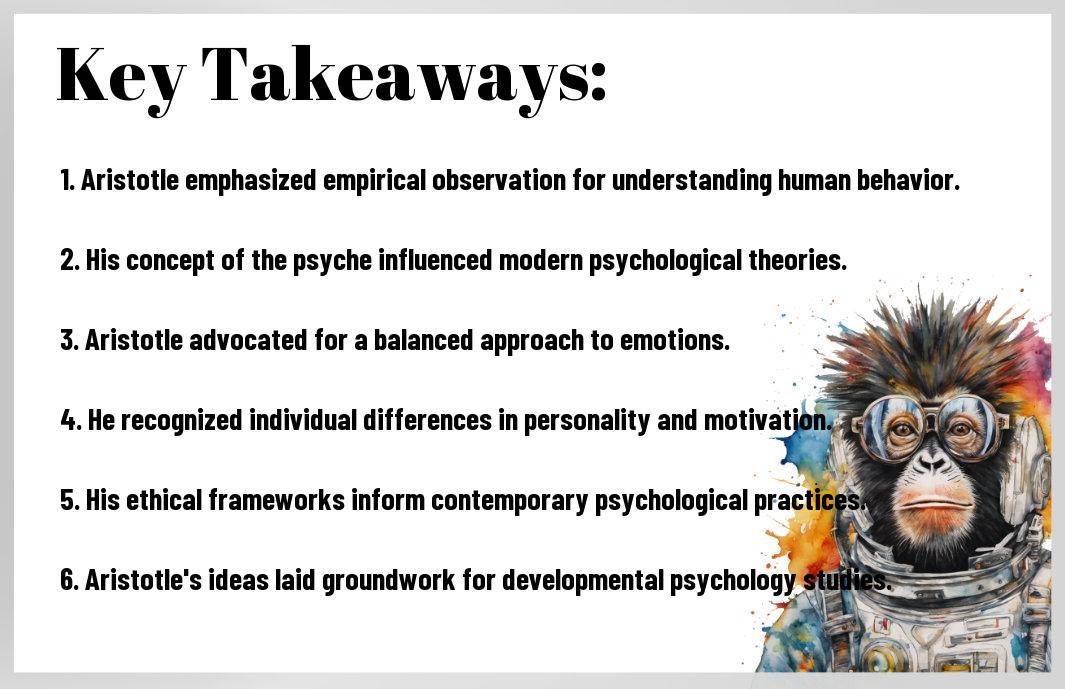Over centuries, the thoughts of Aristotle have significantly influenced many fields, including psychology. As I examine his ideas, I find that they not only provide a foundation for understanding human behavior but also continue to resonate in contemporary psychology. You might be surprised to see how his insights on ethics, emotion, and the human mind still appear in therapeutic practices today. Join me as we explore the lasting impact of Aristotle’s work on modern psychological theories and methodologies.

Key Takeaways:
- Empirical Observation: Aristotle emphasized the importance of observing behavior and experiences, laying a foundation for modern psychological research methods.
- Human Nature: His views on human nature contribute to contemporary discussions of identity, motivation, and personality in psychology.
- Cognitive Development: Aristotle’s ideas about the mind and understanding have influenced theories of cognitive development in children and adolescents.
- Ethics: His exploration of ethics and virtue has shaped psychological approaches to moral development and character education.
- Emotions: Aristotle’s categorization of emotions remains relevant in today’s studies of emotional intelligence and regulation.
- Holistic Approach: Highlighting the body-mind connection, his holistic perspective is echoed in integrative therapeutic practices today.
- Teleological Perspective: The idea that behavior is goal-oriented continues to influence various psychological theories regarding motivation and purpose.

The Heart of Aristotle’s Philosophy
Your understanding of psychology today can significantly benefit from delving into Aristotle’s philosophy. Aristotle’s thoughts provide timeless insight into human nature, emphasizing the importance of adopting a holistic view of the mind. By viewing mental processes not only through the lens of rational thought but also through the role of emotions, there is an opportunity for a deeper understanding of behavior and decision-making. His exploration of the various dimensions of the mind and its functions can be seen as a precursor to modern psychological concepts, where various aspects of our cognitive and emotional experiences are intertwined.
The Nature of the Mind
Along this fascinating journey, I often find myself reflecting on Aristotle’s belief that the mind is not separate from the body; instead, they work as one integrated entity. He argued that our intellect is deeply connected to our sensory experiences, asserting that knowledge is obtained through our interactions with the world. This perspective paved the way for later theories supporting the notion that our thoughts are influenced significantly by our physical states and environments, a point that resonates well with today’s biopsychosocial approach in psychology.
Emotion and Reason: A Balancing Act
The interplay between emotion and reason is another noteworthy aspect of Aristotle’s philosophy that greatly impacts our understanding of psychology. He believed that both elements are important to a well-balanced life, advocating for the idea that neither should dominate the other. In my view, this balancing act is critical as it manifests in how we make decisions, navigate personal relationships, and cope with challenges. Aristotle emphasized that while reason should guide our actions, emotions can play a vital role in motivating us, adding richness and depth to our experiences.
Also, it’s interesting to consider how Aristotle’s views on this balance are echoed in contemporary theories like Emotional Intelligence. Today, psychological practices often focus on recognizing and managing our emotions while engaging in rational thought. Embracing this equilibrium allows us to make more informed choices and enhances our interpersonal relationships, showing that Aristotle’s insights remain relevant and significant in helping us navigate the complexities of human behavior. It’s a beautiful reminder that both emotion and reason are important companions on our journey through life.

Aristotle’s Influence on Modern Psychology
One of the most profound influences of Aristotle on modern psychology can be observed in the development of cognitive psychology. His exploration of the human mind and behavior set the stage for future thinkers to probe deeper into understanding how our thoughts drive our actions. When I immerse myself in Aristotle’s work, I see a foundation for how contemporary psychologists examine cognitive processes such as perception, memory, reasoning, and decision-making. It’s fascinating to think that the inquiry into these aspects was initiated long before the field of psychology as we know it was established.
The Roots of Cognitive Psychology
Influence from Aristotle can easily be traced through the principles that form the foundation of cognitive psychology today. His belief that the mind actively processes information rather than merely reacting to stimuli aligns beautifully with modern theories about cognitive functions. I find it compelling that Aristotle emphasized the importance of perception, memory, and understanding in shaping one’s experiences and decisions, something that resonates well with current cognitive approaches. It reminds me how interconnected our thoughts and feelings are, as well as how they manifest in our behavior.
Understanding Behavior through Aristotle’s Lens
Between Aristotle’s moral philosophy and his inquiries into human behavior, we gain a unique viewpoint that still echoes in psychology. His ideas on virtue ethics suggest that our actions are guided by a pursuit of happiness through balanced life choices, which aligns seamlessly with modern behavioral theories. When I study how behaviors are understood and shaped, I can’t help but reflect on how Aristotle’s insights breathe life into these concepts, allowing us to consider not just the actions, but the motivations behind them.
Understanding behavior through Aristotle’s lens means examining both the individual’s choices and their underlying motivations. His emphasis on the importance of purpose and the pursuit of a flourishing life offers rich context for modern behavioral psychology, where we explore the reasons that drive human actions. It’s like peeling back the layers to see not just what people do, but why they do it. This perspective not only enriches my understanding of human behavior but also serves as a reminder that at the core of our actions are our desires and objectives, a concept that remains relevant and important in psychological inquiry today.
Applications in Contemporary Therapy
Despite the vast advancements in psychological theories and practices, the core ideas of Aristotle continue to resonate in modern therapy. His emphasis on understanding human behavior through the lens of virtue and purpose aligns seamlessly with many contemporary therapeutic approaches. For instance, therapists often encourage clients to explore their values, aspirations, and the meaning they derive from their experiences, echoing Aristotle’s belief that fulfillment comes from actualizing one’s potential. Incorporating such timeless wisdom helps individuals navigate modern life’s complexities while fostering self-awareness and personal growth.
Integrating Aristotelian Principles in Counseling
At the heart of effective counseling lies the ability to connect deeply with clients, and Aristotelian principles can greatly enhance this process. By engaging with clients on a philosophical level, I can help them recognize the importance of virtue ethics—importantly guiding them to reflect on the type of person they want to become. This might involve discussions about their values, what constitutes a good life for them, and how pursuing virtues like courage, compassion, or integrity can lead to greater fulfillment. It’s not just about addressing symptoms; it’s about nurturing the important qualities that enable my clients to thrive.
Aristotle and Positive Psychology
Between the focus on distress and the pursuit of happiness, positive psychology embodies the essence of Aristotle’s vision of eudaimonia, or human flourishing. This psychological movement invites you to cultivate strengths and focus on the aspects of life that bring joy and purpose. I find that by integrating Aristotle’s perspectives, you can embrace the concept of flourishing not simply as a momentary experience but as an ongoing journey towards realizing your true self.
Even Aristotle’s concept of the ‘Golden Mean’ plays a vital role in positive psychology, highlighting the balance between extremes to foster well-being. When you apply this idea in a practical context, it encourages you to seek moderation in your thoughts, actions, and emotions. This balanced approach can reduce anxiety and enhance happiness, guiding you toward a fuller, more meaningful life. By connecting with these Aristotelian ideas, I can assist you in appreciating the richness of your experiences and help cultivate a deeper sense of purpose and fulfillment in your life.
The Impact on Developmental Psychology
All of us experience a fascinating journey of growth and change throughout our lives, and this is where Aristotle’s ideas have shaped the foundation of developmental psychology. By examining how human beings evolve from childhood through adulthood, we can see how ancient concepts still resonate today. Aristotle’s belief in the importance of environment and experience parallels the development of various theories that emphasize the interplay between innate abilities and external factors. This creates a vibrant dialogue around how we understand our own psychological development.
Nature vs. Nurture: An Aristotelian Perspective
Nature has long been a topic of debate in psychology, especially when it comes to developmental changes. Aristotle asserted that while we are born with certain potential, our experiences and environment play a substantial role in shaping who we become. This aligns beautifully with the modern perspective of nature versus nurture, reminding us that both genetic predispositions and life experiences weave together to influence our behaviors and thoughts. As we explore our own lives, we can appreciate how our own paths have been influenced by both our inherent traits and the world around us.
Lifelong Learning and Growth
Across the continuum of life, the idea of lifelong learning resonates strongly within Aristotle’s teachings. He believed that education and personal growth do not cease after a certain age but rather continue throughout our lives. This perspective invites us to embrace learning opportunities at every stage, encouraging curiosity and self-improvement. As you reflect on your own journey, consider the moments that have shaped your understanding and helped you grow. Recognizing that learning can happen at any age fosters a more open mindset.
It is empowering to realize that every experience contributes to our ongoing growth. From embracing new hobbies to seeking out mentorship, there are countless ways to continue evolving. By appreciating this idea, you can cultivate a lifelong commitment to learning, enriching your personal and professional life. Whether it’s picking up a new skill or deepening your understanding of a specific topic, remember that growth is a continuous process, and every step taken is valuable in shaping who you are.
Challenges and Critiques of Aristotelian Ideas
Once again, it’s necessary to explore the challenges and critiques that Aristotelian ideas have faced over the centuries. While Aristotle laid the groundwork for various fields, including psychology, his ideas are not without their limitations. Many psychologists and scholars argue that his theories can sometimes come off as overly simplistic when confronted with the vast complexity of human behavior and mental processes. His focus on empirical observation and classification may neglect the intricate interconnectedness of emotional, social, and biological factors that modern psychology seeks to understand. As we probe deeper into mental health and behavior, it becomes evident that Aristotle’s insights might not fully incorporate contemporary findings about neurobiology and cognitive processes.
Evolving Perspectives in Psychology
Perspectives on psychology have significantly evolved since Aristotle’s time, with new frameworks and approaches emerging to address the intricacies of human experience. While his emphasis on observation contributed to psychology’s empirical roots, current perspectives often highlight the importance of understanding mental processes through a more integrative lens that includes biological, emotional, and environmental influences. You might find it interesting how psychologists now often prioritize a multifaceted approach, combining behavioral, cognitive, and emotional components to create a more comprehensive understanding of human behavior. This evolution reflects our growing understanding of the mind, as well as the emergence of disciplines like cognitive neuroscience, which challenge some of Aristotle’s earlier ideas.
Bridging Tradition with Modern Science
An exciting aspect of contemporary psychology is how it bridges the gap between Aristotle’s foundational ideas and modern scientific advancements. By reassessing Aristotle’s principles through a modern lens, I can see how some of his concepts remain relevant, even as we embrace newer methodologies. For instance, his ideas about naturalistic observation continue to be a fundamental aspect of psychological research, allowing us to gain insights into behavior within real-world contexts. As scientists and psychologists, we can build upon his framework while integrating contemporary research findings to refine our understanding of human thought and behavior.
Understanding how to blend the wisdom of Aristotle with contemporary scientific approaches can enrich our exploration of psychology. By acknowledging the historical context of his theories and recognizing their limitations, we can appreciate the progress made in the field. This journey is not about discarding Aristotle’s contributions but rather enhancing and expanding upon them with modern techniques and insights. As I engage with both traditional philosophies and scientific advancements, I find a richer perspective that honors the past while eagerly embracing the future of psychology.
The Future of Psychology and Aristotle’s Legacy
Now more than ever, I find that Aristotle’s contributions provide a timeless framework for psychological inquiry and practice. As we explore into the complexities of human behavior, emotions, and cognition, his emphasis on observation and categorization remains relevant. I see contemporary researchers building upon his insights, exploring themes of virtue, character, and the essence of human experience. This evolving dialogue between ancient philosophy and modern psychology is not just fascinating; it’s pivotal in shaping the direction of future psychological studies and therapeutic practices.
Continued Relevance in Current Research
Below, I am excited to highlight how current research continues to draw inspiration from Aristotle. For instance, his notions of happiness and ethics, particularly in Positive Psychology, resonate deeply with today’s scholars. Researchers are increasingly acknowledging the importance of virtues and personal growth, echoing Aristotle’s belief that nurturing our character is imperative for achieving true well-being. I believe this alignment demonstrates the enduring value of Aristotle’s thoughts in not only understanding but also enhancing the human experience.
Combining Ancient Wisdom with New Discoveries
Above all, I see a harmonious blend emerging between ancient wisdom and cutting-edge discoveries. This fusion allows you and me to access a deeper understanding of nuanced psychological concepts. For instance, modern neuroscience is beginning to validate some of his claims about the interplay between reason and emotion. Cleanly integrating Aristotle’s insights enables us to create a more comprehensive approach to mental health, addressing both the emotional and rational facets of our existence in holistic therapies.
Psychology today is evolving in fascinating ways as we combine rich philosophical traditions with otherwise modern findings. This intersection encourages you to engage with both ancient texts and the latest research, cultivating a more rounded perspective on our thoughts and behaviors. By drawing from the wisdom of thinkers like Aristotle, we can pave innovative paths in therapy and self-reflection, ultimately enhancing our understanding of the human experience in this ever-changing world.
Summing up
The influence of Aristotle on psychology is truly fascinating, and I find it amazing how his ideas continue to resonate with us today. His emphasis on the importance of virtue, reasoning, and understanding human behavior gives us tools to navigate our own lives more effectively. I believe that by incorporating Aristotle’s philosophies into our own perspectives, we can strive toward not just better mental health but a more meaningful existence. If you’re looking to explore this further, I recommend checking out 3 Ideas from Aristotle on How to Build a Good Life, as it offers practical insights that you can apply.
In some ways, I feel that Aristotle was a pioneer in understanding the complexities of the human experience, blending philosophy and early psychology effortlessly. His ideas remind us to reflect on our actions and pursuit of happiness, making psychology not just about therapy but about thriving in life. By embracing these timeless concepts, we can all work towards achieving our own version of eudaimonia, enhancing not just our mental well-being but also our relationships with others and the world around us.
FAQ
Q: How did Aristotle contribute to the foundations of psychology?
A: Aristotle is often regarded as one of the earliest psychologists due to his systematic observations and writings on human behavior and the mind. He emphasized empirical observation and believed that understanding human nature involved studying the soul and behavior. His works, particularly “Nicomachean Ethics” and “De Anima,” laid the groundwork for later psychological theories by exploring concepts such as motivation, perception, and the relationship between emotions and reasoning.
Q: In what ways does Aristotle’s concept of virtue ethics influence modern psychology?
A: Aristotle’s virtue ethics, which posits that moral character and virtues play a significant role in achieving happiness (eudaimonia), has influenced modern psychology, especially in the fields of positive psychology and character development. Today, psychologists focus on strengths and virtues to enhance well-being, aligning with Aristotle’s emphasis on cultivating personal virtues as a pathway to a fulfilling life.
Q: What insights did Aristotle provide regarding human emotions that are relevant today?
A: Aristotle’s exploration of emotions, particularly in “Rhetoric,” offers insights into the ways emotions can influence behavior and decision-making. His understanding of the balance between reason and emotion has informed contemporary psychological theories, particularly in cognitive-behavioral therapy (CBT), which emphasizes the importance of managing emotions to influence cognitive processes and behaviors effectively.
Q: How does Aristotle’s view on the purpose of psychology differ from modern perspectives?
A: Aristotle viewed psychology as a study of the soul and its functions, aiming for a holistic understanding of human behavior in the context of ethics and virtue. In contrast, modern psychology often focuses more on scientific methods and empirical research, leading to specialized fields such as clinical psychology, cognitive psychology, and neuropsychology. Despite these differences, both approaches seek to understand and improve human well-being.
Q: What role does Aristotle’s theory of potentiality and actuality play in psychological development?
A: Aristotle’s concepts of potentiality (the inherent capacity for change) and actuality (the realization of potential) resonate in developmental psychology. This theory emphasizes that individuals have the potential to grow and develop throughout their lives. Modern developmental theories, including those focusing on growth mindset and lifelong learning, parallel Aristotle’s views by highlighting the importance of nurturing one’s potential across various life stages.
Q: How does Aristotle’s idea of the ‘Golden Mean’ apply to psychology?
A: The ‘Golden Mean’ suggests that virtue lies between extremes. This concept translates into psychological practice by encouraging individuals to seek balance in their emotions and behaviors. Therapies today promote moderation, helping clients develop resilience and adaptability by avoiding extremes of emotional expression and fostering healthier coping mechanisms.
Q: Can elements of Aristotle’s philosophy be found in cognitive-behavioral therapy?
A: Yes, elements of Aristotle’s philosophy can indeed be found in cognitive-behavioral therapy (CBT). CBT focuses on the interplay between thoughts, emotions, and behaviors, aligning with Aristotle’s insights into the importance of rationality and understanding emotional responses. This psychological approach encourages individuals to critically evaluate their thoughts and assumptions, much like Aristotle’s emphasis on self-reflection and grounding actions in ethical reasoning.



